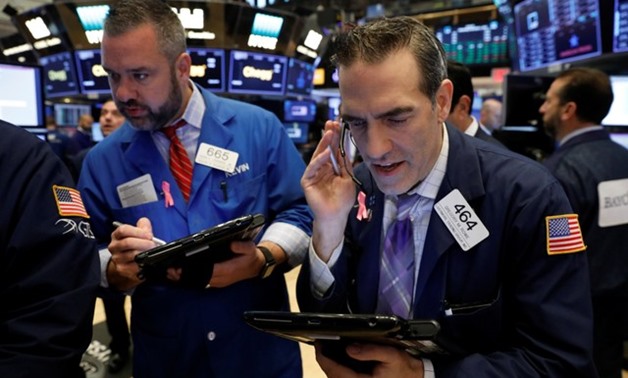
Traders work on the floor of the New York Stock Exchange shortly after the opening bell in New York, U.S., November 1, 2017 - REUTERS/Lucas Jackson
LONDON - 3 November 2017: World shares took a breather and the dollar crept up on Friday, as investors turned their attention to monthly U.S. jobs data after welcoming the appointment of a centrist to the helm of the country's central bank, the Federal Reserve.
MSCI's world equity index, which tracks shares in 47 countries, was on course for its first dip in seven sessions - barely noticeable after the latest wave of record highs.
European shares inched up in early deals as tech stocks gained after Apple's stock hit new heights. Carmakers offset drops elsewhere from the likes of French bank Societe Generale . Wall Street was set to open higher.
More than half of MSCI Europe companies have reported third quarter earnings, of which 67 percent have either met or beaten analysts' expectations, according to Thomson Reuters I/B/E/S data.
"Those (smaller beats) and the big beats, once you add them all together, makes it actually a fairly good earnings season, hence why markets are where they are," Mike van Dulken, head of research at Accendo Markets, said.
"We're seeing the European Central Bank strike a dovish tone, we've seen the Bank of England clearly deliver a more dovish message on less hikes over a longer term, the Fed nomination (is) very much being seen as a steady as she goes so yes, rates are higher ... but it's still a very much accommodative environment for a good while longer," he added.
Earlier in Asia, a holiday in Japan kept volumes light. Australia's main index firmed 0.4 percent and China's blue chips dropped half a percent. MSCI's broadest index of Asia-Pacific shares outside Japan inched up 0.1 percent to be just under its highest since late 2007.
News that Federal Reserve Governor Jerome Powell would be the new head of the U.S. central bank was widely expected. It left focus almost squarely on the U.S. payrolls report, which is expected to show a big rebound from September's hurricane-hit figures. The data is due at 1230 GMT.
Powell has backed current Fed Chair Janet Yellen's direction on monetary policy for the past five years, and, in recent years has shared her concerns that weak inflation justified a cautious approach to raising interest rates.
The dollar rose, with the index measuring it against a basket of peer currencies up 0.1 percent, though it was down for the week for the first time in three weeks, most because of its loss against the euro.
In Washington, House Republicans also finally disclosed their long-delayed plans for tax cuts that President Donald Trump has promised, setting off a frantic race in Congress to give him his first major legislative victory.
Passage of legislation that mainly favours corporations and the wealthy was far from certain, though, and some business groups quickly came out against it.
The Australian dollar was the big loser of the day in currencies, falling half a percent after disappointing retail sales data.
Sterling also dropped to a one-month low against the dollar after plunging on Thursday in the wake of the Bank of England's first interest rate rise in a decade. It was heading for its third straight week of declines against the dollar.
Emerging markets largely took in stride the news that Venezuela plans to restructure its burgeoning foreign debt .
There has been speculation of such a move for years. The cash-strapped OPEC nation's collapsing economy has left its population struggling to find food and medicine.
In commodity markets, spot gold was steady at $1,274.13 an ounce, after touching its highest since Oct. 20 at$1,284.10 on Thursday.
London nickel prices renewed their advance, putting the metal on course for a gain of nearly 10 percent this week and 27 percent year-to-date on expectations of bullish demand from the electric vehicle battery sector.
Oil prices edged back up toward recent two-year peaks as OPEC-led output cuts tightened supplies and drained inventories.
Brent crude gained 0.4 percent to $60.82 per barrel. The benchmark hit $61.70 on Wednesday, its highest since July 2015. U.S. crude gained 0.3 percent to $54.70, almost 30 percent above its June lows.


Comments
Leave a Comment